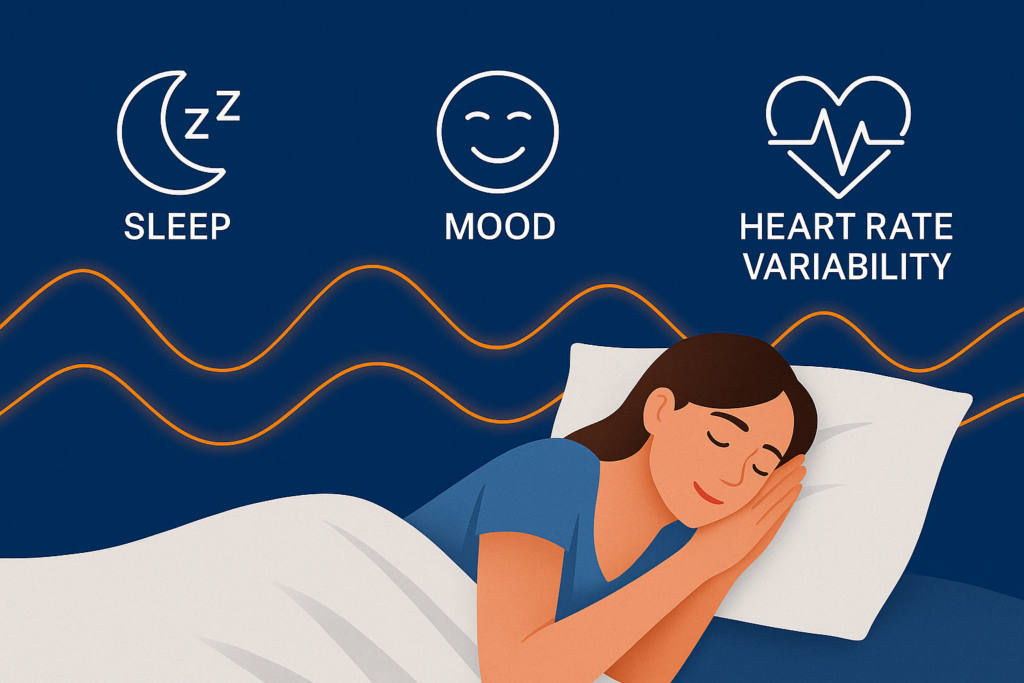Effect of Brainwave Entrainment and EMF reduction technology on quality of sleep, mood, and heart rate variability: pilot study with healthy individuals.
Aim
The main objective of this study was to evaluate the effect of Brainwave Entrainment and EMF reduction technology, either alone or combined on quality of sleep and mood.
Methods
The study was conducted over the course of six (6) weeks. Sample size consisted of 20 volunteers who were not making use of analgesics, anti-inflammatories, or sleep aids at least seven (7) days prior to, as well as during the study, and who had no hearing disabilities. Sleep and mood were evaluated through the Pittsburgh Quality of Sleep Index (PQSI), Profile of Mood States (POMS) questionnaire, and the Depression, Anxiety and Stress Scale (DASS-21). Participants were asked to undergo two (2) Braintap sessions a day (Braintap Headset,New Bern – NC – USA) and be in close proximity to a SomavedicTM EMF reduction technology during the day and particularly during sleep for the duration of the study.
Results
There was a statistically significant decrease in stress and depression scores (p<0.05), and a decrease in anxiety, however it was not statistically significant (p=0.0003). The intervention was also effective to improve mood as observed by a statistically significant increase (p<0.05). There was also a statistically significant increase in Quality of Sleep (PQSI total score, p<0.05), as well as on sub scales II (sleep latency), III (sleep duration), V (sleep disturbance), and VII (daytime dysfunction); positive results in sub scales I (subjective sleep quality) and IV (sleep efficiency), although not statistically significant (p=0.1981 and p=0.3122,respectively); finally, on Subscale VI (use of sleep medication), one participant started making use of sleep aids, negatively affecting results (p=0.6811).
Conclusion
Overall, our results indicate positive effects of Brainwave Entrainment and EMF reduction technology on quality of sleep, stress, depression, and mood. Limitations of this trial are the small sample size, and the fact that the study was not placebo controlled. A randomized blinded placebo-controlled trial with a lager sample size study is awarded.

Figure 1 – Depression, Anxiety and Stress Scale (DASS-21). Lower scores indicate improvement. NS: Not statistically significant. *p<0.05 when compared to baseline evaluation. Paired t-test analysis (prism graphpad 9, La Jola USA).

Figure 2 – Profile of Mood States (POMS). Lower scores indicate less disturbances to mood, hence, better overall mood. NS: Not statistically significant. *p<0.05 when compared to baseline evaluation. Paired t-test analysis (prism graphpad 9, La Jola USA).

Figure 3 – Pittsburgh Quality of Sleep Index (PQSI). Lower scores indicate less disturbances to sleep, hence better quality of sleep. Global PSQI Score (PQSI); Component 1 (PQSI I): Subjective sleep quality; Component 2 (PQSI II): Sleep latency; Component 3 (PQSI III): Sleep duration; Component 4 (PQSI IV): Sleep efficiency; Component 5 (PQSI V): Sleep disturbance; Component 6 (PQSI VI): Use of sleep medication; Component 7 (PQSI VII): Daytime dysfunction. NS: Not statistically significant. *p<0.05 when compared to baseline evaluation. Paired t-test analysis (prism graphpad 9, La Jola USA).
Study #17 – PhD thesis of the Post Graduate Program in Health Sciences at the University of Southern Santa Catarina, SC, Brazil. Presented virtually at the 3d International Conference on Cognitive and Behavioral Neurosciences (Sep 13-14, 2023 at Barcelona, Spain).
